OUR OQEANOUS STUDENTS
- HOME
- OUR OQEANOUS STUDENTS
- IJP
- IJP Report(KU Nov 2022 - Mar 2023)
International Joint Program
IJP Report(KU Nov 2022 - Mar 2023)
2023.04.20
Graduate School of Marine Science and Technology
Course of Marine Resources and Environment
Second Year of Master's Program
N. S.
I studied at Kasetsart University (KU) in Thailand for three months and a half, from November 28, 2022 to March 10, 2023. I hope this report of my experience will be helpful to students who are thinking about studying abroad or those who are interested in Thailand.
[Reason for Application]
"Why did you study in Thailand?"
This is a question that many people have asked me before, during, and after my study in Thailand.
The first reason is the field. Thailand is located in Southeast Asia and has many coral reefs. TUMSAT is located by Tokyo Bay, where my research subject, jellyfish, is located. I enjoy studying jellyfish, but I have always wanted to do research related to coral reef conservation. It is not impossible to attempt coral reef conservation study at TUMSAT, but I am limited in what I can do. I thought that Thailand might be a good place for me to do coral reef conservation research! So I consulted with my advisor at KU, and he cooperated with me and said, "Let's try it together," so I decided to go to KU in Thailand.
Second, I wanted to study abroad in Southeast Asia. Thailand, Indonesia, and Malaysia are newly added to IJT program at OQEANOUS Plus Program, in addition to China and Korea.
I had studied in Hong Kong and Ireland in the past as part of the "overseas expedition program," and decided to go to Thailand because I wanted to challenge myself in an area I had never been to before.
[Life in Thailand]
"What is life like in Thailand?"
People around me often ask me this question as well, so I will introduce it by theme.
[Food culture]
Thai food, of course. It is spicy and rich in seafood such as shrimp and squid. I enjoyed rice and noodle soup varieties. The school cafeteria at KU is well stocked and there are many food stalls, which I looked forward to every meal. The food was affordable, and you could eat a full meal for only 160 yen. Although the image of Thai food is one of spicy food, there are also many sweet foods available. When ordering drinks, I always ordered them with less sweetness.
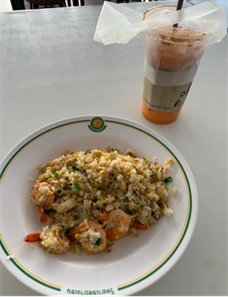
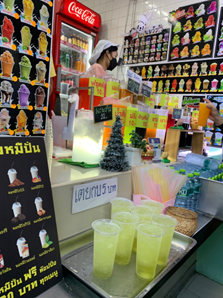
Photo 1) Both of the above two pictures are taken at a cafeteria in KU. On the left is a tea called "cha-thai" and a fried rice called "khao pad". On the right is a drink shop with a wide variety of drinks.
[Language]
Of course, the language is Thai, but, Thai has a variety of pronunciations, and is hard for Japanese to learn, so I mainly used English in my life. To my surprise, however, Thai is the only language understood in this country. There were many situations where I had to use a translation apps, show pictures, use hand gestures and get through with a strong heart. However, thanks to the help of my friends and teachers at the university, I was able to have fun and exciting days. There are not many Thai people who speak English, but more than that, they are kind and caring people who will help you if you are in trouble, so I think you can study in Thailand with peace of mind.
[Living]
I lived in the international student dormitory at KU. It was conveniently located, with a laundromat and convenience store within walking distance. There were also places to get drinking water in the dormitory and on campus, so I did not have any problems. Variety of transportation options were available, such as taking the free university bus from the bus stop in front of the dormitory, riding a rental bicycle at the dormitory, using a bike taxi, taking the train (BTS), or getting a ride from an acquaintance on a car or motorcycle. You can get good clothing for as little as 800 yen. Since it is a hot country, I recommend that you take good care of yourself, being careful not to get heat stroke or food poisoning. Also, to avoid traffic accidents, make sure to cross the street with caution even when the traffic light is green. I stayed during the dry season, so it was sunny every day. If you are visiting during the rainy season, please be careful because squalls can be severe, and the area is said to be flooded.
"What did you study?"
[Classes]
At KU, I was a first-year master's student in the Fisheries Department. I took graduate classes on fisheries, sustainable methods of aquaculture, and marine reserve use. The classes were small, ranging from 2 to 6 students. So that there were many opportunities to actively being asked for your opinion and to present your work, allowing you to learn proactively. I also participated in an undergraduate scuba diving class. Thanks to the unique and kind teachers and KU students, I was able to have fun every day.
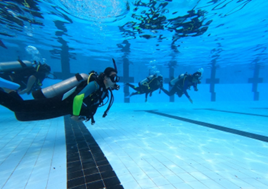
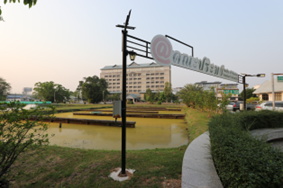
Photo 2) On the left is a view inside the pool of the scuba class. Right: A view of the KU Fisheries Department.
[Research]
There was no core time for lab activities. I studied independently what I wanted to do such as reading papers on previous research in the time between classes. I also made a research plan with my academic advisor. Following the plan, I went on a field trip, dived and collected data, and gave a slide presentation of the results and discussed in English before returning to my home country. I am glad that I had the valuable experience of learning about a field of coral reef conservation that was new to me from scratch, researching it in a short period of time, taking on challenges, and producing results.
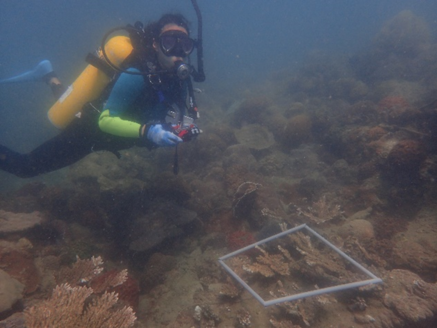
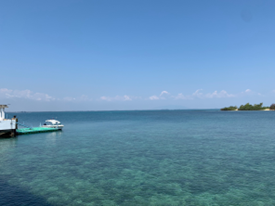
Photo 3) Coral reef survey diving conducted as part of my research.
A message to those who are interested in studying abroad now or to those who are not sure about it
The time you can be a student in your life is a blink of an eye, and I recommend that you go if you want to challenge yourself to study abroad, even just a little bit. The reason is that you never know what you will do unless you try, and you may regret it later, if you don't.
Before making up my mind, I had many worries and obstacles to overcome, such as the fact that it would overlap with my preparation period for job hunting, the fact that I would not be able to do research or care for jellyfish at TUMSAT during that time, and the fact that I would be living abroad for a long period of time.
Nevertheless, I did not give up, and with the help of others, I was able to successfully complete my first IJP program from TUMSAT to KU. Please take a step forward without forgetting your gratitude and respect for your friends, family, those who helped you, and your desire to study abroad. I bet you will see a new landscape!
I personally recommend Thailand for those who are not good at speaking English but would like to study in other country. Through my experience of studying abroad in three different countries, I discovered that I had more opportunities to speak English in Thailand than in English-speaking countries, because the Thai people were calm, friendly, and willing to listen to what I had to say. If your main point is not learning native English pronunciation, but to be able to converse independently in English, please consider going to Thailand.
In Thailand, there is a saying, "Mai Pen Rai. It means, "It will be okay, it will be alright." Even if you make mistakes or have troubles, think of it as a good chance for you to grow as a student and try it with the "Mai Pen Rai" spirit!

